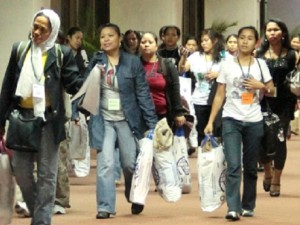MANILA, Philippines — The European Union said Thursday it would help fund a project to encourage the families of millions of Filipino overseas workers to save money and use it to develop their home towns.
While Filipino expatriates remitted close to P1.03 trillion ($23.8 billion) to the Philippines last year, only a trickle went into savings accounts, according to United Nations, EU and Filipino officials at the project launch.
“If you look at the Philippines, it’s obvious that migration has been a tremendous success story and is driving the economy and its growth… although it has also some issues that need to be addressed,” said Hans Farnhammer, operations chief of the EU delegation to the Philippines.
Rebeca Grynspan, associate administrator for the UN Development Program, said the Philippines was one of eight countries supplying labor overseas that would get funding over the next three years under a $10 million global “migration and development initiative.”
The Philippine program, expected to cost about $900,000, will be funded by the EU and Switzerland and run by the Philippine government’s Commission on Filipinos Overseas.
The commission will hire non-government organizations to help local governments design financial training programs for the families of about 10.4 million Filipinos who live abroad, the commission’s head Imelda Nicolas told reporters.
While remittances have helped improve lives in a country that suffers from widespread poverty, Nicolas said just three to five percent of the money went into savings.
“That’s very insignificant,” she said, adding the bulk was spent on food, medical expenses and tuition fees for their children in school.
“We have to teach the families left behind how to save, how to plan for the future. When they (family members working abroad) decide to retire they’ll have savings and investments that they could live on.”
The training modules would also teach families of overseas workers where to invest their savings so they could be used to develop their communities, she added.
